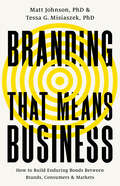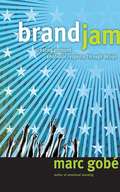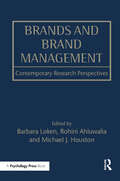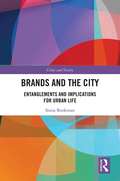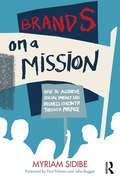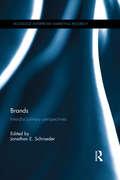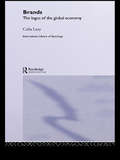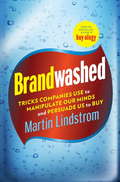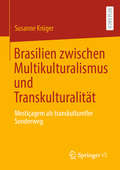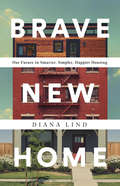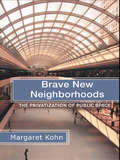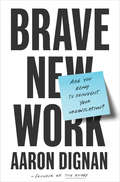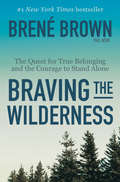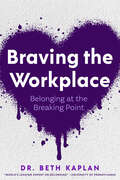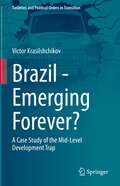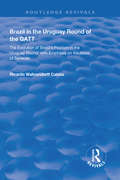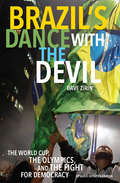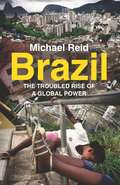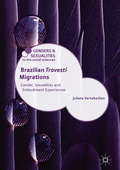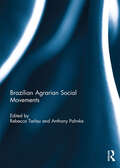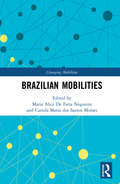- Table View
- List View
Branding that Means Business: How to Build Enduring Bonds between Brands, Consumers and Markets
by Matt Johnson Tessa G MisiaszekA revelatory guide on how to build, sustain and grow a brand. A brand is either beloved, or it&’s noise. We live in a fast-paced world of immediate gratification where consumers can listen to any song, watch any movie, or read any article, with the touch of a few buttons. They are peppered with hyper-personalized targeting for products that can be ordered seamlessly and arrive within hours. And if your brand isn&’t the first to come to mind, they&’ll click that button and it&’ll be delivered by someone else. So how do you make sure your brand connects with consumers? Branding that Means Business draws from the authors&’ experience and business literature as well as psychology, sociology, and even anthropology to show readers that while any brand serves the business, the mechanisms that enable it are all about connecting with people. Readers will learn how to create, maintain, and operationalize their brand, and think creatively about how to differentiate their product and most importantly, make consumers fall in love with it.
Branding the Man
by Bertrand PellegrinBrand strategist and retail consultant Bertrand Pellegrin breaks down the psychological and sociological elements that influence men's clothing choices, and what they mean to retail clothiers. This is much more detailed than just "clothes make the man", and includes case studies to illustrate how an understanding of male clothing behaviors can be translated into successful retail sales. Annotation c2010 Book News, Inc. , Portland, OR (booknews. com)
Brandjam: Humanizing Brands Through Emotional Design
by Marc GobeBrandjam, the follow-up to the groundbreaking best-seller Emotional Branding, presents a powerful new concept from renowned designer and business guru Mark Gobe. The Brandjam concept is about innovation, intuition, and risk. Gobe explains how design is the "instrument" companies can use for jazzing up a brand-how design puts the face on the brand and creates an irresistible message that connects buyers to the product in a visceral way. Using jazz as his metaphor, he shows how the instinctive nature of the creative process leads to unusual solutions that make people gravitate toward a brand and make brands resonate with people by bringing more joy into their lives. It explores how design represents the personality of a company and provides its window to the world. Brandjam is an inspiration for brands and people as it reveals the transforming impact brands have on their audience. Follow-up to Emotional Branding-50,000 copies sold in nine languages Insider's look at creating powerful, compelling brands and identities Exciting new ideas for using design to drive consumers to embrace brands
Brands and Brand Management: Contemporary Research Perspectives (Marketing And Consumer Psychology Ser.)
by Barbara Loken Rohini Ahluwalia Michael J. HoustonVery few books exist that meaningfully integrate the rich and vast body of scientific research and theories that have accumulated in the field, relating to both traditional and contemporary topics in branding. This book accomplishes that task, with contributions from leading experts in the science of branding, national and international. The book should appeal to all students, faculty, and marketing professionals with an interest in research findings about brands, and an interest in deepening their understanding of how consumers view brands.
Brands and the City: Entanglements and Implications for Urban Life (Cities and Society)
by Sonia BookmanFrom commercial retail environments to branded urban villages, brands are now a salient feature of contemporary cityscapes and are deeply entwined in people’s everyday lives. Drawing on extensive empirical material and recent theoretical developments in the sociology of brands, this book explores the complex relationship between brands, consumption and urban life. Covering a range of brands and branding in the city, from themed retail stores to branded cultural quarters, it considers how brands provide new ways of mediating identities, lifestyles and social relations. At the same time, the book reveals how brands are bound up with forms of socio-spatial division and exclusion in the city, defining what kinds of practices, images or attitudes are acceptable in a particular place, constituting cultural boundaries that keep certain people and activities out. With attention throughout to the social and cultural implications of the presence of brands in urban space, Brands and the City examines how people engage with brands, and how brands shape urbanites’ experiences and sense of self, society and space. An extensive exploration of the processes through which brands are integrated into cities, their effects on everyday experiences and their role in the policing and governance of urban space, this book will appeal to scholars across the social sciences with interests in urban studies, consumption and branding.
Brands on a Mission: How to Achieve Social Impact and Business Growth Through Purpose
by Myriam SidibeBrands on a Mission explores the importance of creating a performance culture that is built on driving impact through purpose, and the type of talent required to drive these transformational changes within companies – from CEO to brand developers. Using evidence from interviews and stories from over 100 CEOs, thought leaders and brand managers, the book presents an emergent model that organisations can follow to build purpose into their growth strategy – and shows how to bridge the gap between Brand Say and Brand Do. Readers will learn from the real experts in the field: how Paul Polman, former CEO of Unilever, built purpose into the DNA of his company; what keeps Alan Jope (new CEO, Unilever) and Emmanuel Faber (CEO, Danone) awake at night; and how brand developers from Durex, Dove, Discovery and LIXIL have made choices and the reasons behind them. In this book you will learn how a soap brand Lifebuoy taught one billion people about hygiene, how a beer is tackling gender-based violence, and how a toothpaste is tackling school absenteeism amongst many others. Renowned experts like Peter Piot (Director, London School of Health and Tropical Medicine), Michael Porter (Professor, Harvard School of Business), Jane Nelson (Director, Corporate Responsibility Initiative, Harvard Kennedy School) and Susie Orbach (leading feminist and formerly professor, London School of Economics) also share examples, data and their everyday experiences of helping corporates create a culture of purpose. And leading NGOs and UN experts like Lawrence Haddad (Executive Director, GAIN) and Natalia Kanem (Executive Director of UNFPA) will recount how the public and private sector have worked together to create an accelerated path to reaching the Sustainable Development Goals by 2030. The book provides a clear pathway of how to take brands through the journey of developing impactful social missions and driving business growth, and is an essential guide for both managers and students alike.
Brands: Interdisciplinary Perspectives (Routledge Interpretive Marketing Research)
by Jonathan E. SchroederBranding has emerged as a cornerstone of marketing practice and corporate strategy, as well as a central cultural practice. In this book, Jonathan Schroeder brings together a curated selection of the most influential and thought-provoking papers on brands and branding from Consumption Markets and Culture, accompanied by new contributions from leading brand scholars Giana Eckhardt, John F. Sherry, Jr., Sidney Levy and Morris Holbrook. Organised into four perspectives – cultural, corporate, consumer, critical - these papers are chosen to highlight the complexities of contemporary branding through leading consumer brands such as Disney, eBay, Guinness, McDonalds, Nike, and Starbucks. They address key topics such as celebrity branding, corporate branding, place branding, and retail branding and critique the complexities of contemporary brands to provide a rich trove of interdisciplinary research insights into the function of brands as ethical, ideological and political objects. This thought-provoking collection will be of interest to all scholars of marketing, consumer behaviour, anthropology and sociology, and anyone interested in the powerful roles brands play in consumer’s lives and cultural discourse.
Brands: Meaning and Value in Media Culture
by Adam ArvidssonDrawing on rich empirical material, this revealing book builds up a critical theory, arguing that brands have become an important tool for transforming everyday life into economic value. When branding lifestyles or value complexes onto their products, companies assume that consumers desire products for their ability to give meaning to their lives. Yet, brands also have a key function within managerial strategy. Examining the history of audience and market research, marketing thought and advertising strategy; the first part of this book traces the historical development of branding, whilst the second part evaluates new media, contemporary management and overall media economics to present the first systematic theory of brands: the brand as a key institution in information capitalism. It includes chapters on: consumption marketing brand management online branding the brand as informational capital. Richly illustrated with case studies from market research, advertising, shop displays, mobile phones, the internet and virtual companies, this outstanding book is essential reading for students and researchers of the sociology of media, cultural studies, advertising and consumer studies and marketing.
Brands: The Logos of the Global Economy (International Library of Sociology)
by Celia LuryBrands are everywhere: in the air, on the high-street, in the kitchen, on television and, maybe even on your feet. But what are they? The brand, that point of connection between company and consumer, has become one of the key cultural forces of our time and one of the most important vehicles of globalization. This book offers a detailed and innovative analysis of the brandIllustrated with many examples, the book argues that brands:* mediate the supply and demand of products and services in a global economy* frame the activities of the market by functioning as an interface* communicate interactively, selectively promoting and inhibiting communication between producers and consumers* operate as a public currency while being legally protected as private property in law* introduce sensation, qualities and affect into the quantitative calculations of the market* organize the logics of global flows of products, people, images and events.This book will be essential reading for students of sociology, cultural studies and consumption.
Brandwashed: Tricks Companies Use to Manipulate Our Minds and Persuade Us to Buy
by Martin LindstromForeword by Morgan SpurlockFrom the bestselling author of Buyology comes a shocking insider's look at how today's global giants conspire to obscure the truth and manipulate our minds, all in service of persuading us to buy. Marketing visionary Martin Lindstrom has been on the front lines of the branding wars for over twenty years. Here, he turns the spotlight on his own industry, drawing on all he has witnessed behind closed doors, exposing for the first time the full extent of the psychological tricks and traps that companies devise to win our hard-earned dollars. Picking up from where Vance Packard's bestselling classic, The Hidden Persuaders, left off more than half-a-century ago, Lindstrom reveals: * New findings that reveal how advertisers and marketers intentionally target children at an alarmingly young age - starting when they are still in the womb! * Shocking results of an fMRI study which uncovered what heterosexual men really think about when they see sexually provocative advertising (hint: it isn't their girlfriends). * How marketers and retailers stoke the flames of public panic and capitalize on paranoia over global contagions, extreme weather events, and food contamination scares. * The first ever neuroscientific evidence proving how addicted we all are to our iPhones and our Blackberry's (and the shocking reality of cell phone addiction - it can be harder to shake than addictions to drugs and alcohol). * How companies of all stripes are secretly mining our digital footprints to uncover some of the most intimate details of our private lives, then using that information to target us with ads and offers 'perfectly tailored' to our psychological profiles. * How certain companies, like the maker of one popular lip balm, purposely adjust their formulas in order to make their products chemically addictive. * What a 3-month long guerilla marketing experiment, conducted specifically for this book, tells us about the most powerful hidden persuader of them all. * And much, much more. This searing expose introduces a new class of tricks, techniques, and seductions - the Hidden Persuaders of the 21st century- and shows why they are more insidious and pervasive than ever. From the Hardcover edition.
Brasilien zwischen Multikulturalismus und Transkulturalität: Mestiçagem als transkultureller Sonderweg
by Susanne KrügerDas Buch hinterfragt, inwiefern sich die ethnisch durchmischte Zusammensetzung der brasilianischen Gesellschaft in den aus der Theorie bekannten Dualismus von Multikulturalismus und Transkulturalität einordnen lässt. Der brasilianische Begriff der mestiçagem – übersetzt mit Rassenmischung – wird also in diesem zeitgenössischen Kontext kulturbezogener Forschung neu vermessen. Die Autorin reflektiert ideengeschichtlich multi- und transkulturelle Ansätze und zeigt auf, dass diese oftmals von einer westlich zentrierten Voreingenommenheit eingeengt sind. Der Blick auf die brasilianische Identitätskonstruktion wird als Anstoß genommen, über alternative Perspektiven nachzudenken.
Brave New Home: Our Future in Smarter, Simpler, Happier Housing
by Diana LindA smart, provocative look at how the American Dream of single-family homes, white picket fences and two-car garages became a lonely, overpriced nightmare, and how new trends in housing can help us live better. Over the past century, American demographics and social norms have shifted dramatically. More people are living alone, marrying later in life, and having smaller families. At the same time, their lifestyles are changing, whether by choice or by force, to become more virtual, more mobile, and less stable. But despite the ways that today's America is different and more diverse, housing still looks stuck in the 1950s. In Brave New Home, Diana Lind shows why a country full of single-family houses is bad for us and our planet, and details the new efforts underway that better reflect the way we live now, to ensure that the way we live next is both less lonely and more affordable. Lind takes readers into the homes and communities that are seeking alternatives to the American norm, from multi-generational living, in-law suites, and co-living to microapartments, tiny houses, and new rural communities.Drawing on Lind's expertise and the stories of Americans caught in or forging their own paths outside of our cookie-cutter housing trap, Brave New Home offers a diagnosis of the current crisis in American housing and a radical re-imagining of the possibilities of housing.
Brave New Neighborhoods: The Privatization of Public Space
by Margaret KohnFighting for First Amendment rights is as popular a pastime as ever, but just because you can get on your soapbox doesn't mean anyone will be there to listen. Town squares have emptied out as shoppers decamp for the megamalls; gated communities keep pesky signature gathering activists away; even most internet chatrooms are run by the major media companies. Brave New Neighborhood sconsiders what can be done to protect and revitalize our public spaces.
Brave New Work: Are You Ready to Reinvent Your Organization?
by Aaron Dignan“This is the management book of the year. Clear, powerful and urgent, it's a must read for anyone who cares about where they work and how they work.” —Seth Godin, author of This is Marketing “This book is a breath of fresh air. Read it now, and make sure your boss does too.” —Adam Grant, New York Times bestselling author of Give and Take, Originals, and Option B with Sheryl SandbergWhen fast-scaling startups and global organizations get stuck, they call Aaron Dignan. In this book, he reveals his proven approach for eliminating red tape, dissolving bureaucracy, and doing the best work of your life.He’s found that nearly everyone, from Wall Street to Silicon Valley, points to the same frustrations: lack of trust, bottlenecks in decision making, siloed functions and teams, meeting and email overload, tiresome budgeting, short-term thinking, and more. Is there any hope for a solution? Haven’t countless business gurus promised the answer, yet changed almost nothing about the way we work? That’s because we fail to recognize that organizations aren’t machines to be predicted and controlled. They’re complex human systems full of potential waiting to be released. Dignan says you can’t fix a team, department, or organization by tinkering around the edges. Over the years, he has helped his clients completely reinvent their operating systems—the fundamental principles and practices that shape their culture—with extraordinary success. Imagine a bank that abandoned traditional budgeting, only to outperform its competition for decades. An appliance manufacturer that divided itself into 2,000 autonomous teams, resulting not in chaos but rapid growth. A healthcare provider with an HQ of just 50 people supporting over 14,000 people in the field—that is named the “best place to work” year after year.. And even a team that saved $3 million per year by cancelling one monthly meeting. Their stories may sound improbable, but in Brave New Work you’ll learn exactly how they and other organizations are inventing a smarter, healthier, and more effective way to work. Not through top down mandates, but through a groundswell of autonomy, trust, and transparency.Whether you lead a team of ten or ten thousand, improving your operating system is the single most powerful thing you can do. The only question is, are you ready?
Braving the Wilderness: The Quest for True Belonging and the Courage to Stand Alone
by Brené Brown#1 NEW YORK TIMES BESTSELLER • REESE&’S BOOK CLUB PICK • A timely and important book that challenges everything we think we know about cultivating true belonging in our communities, organizations, and culture, from the #1 bestselling author of Rising Strong, Daring Greatly, and The Gifts of ImperfectionDon&’t miss the five-part Max docuseries Brené Brown: Atlas of the Heart!&“True belonging doesn&’t require us to change who we are. It requires us to be who we are.&” Social scientist Brené Brown, PhD, MSW, has sparked a global conversation about the experiences that bring meaning to our lives—experiences of courage, vulnerability, love, belonging, shame, and empathy. In Braving the Wilderness, Brown redefines what it means to truly belong in an age of increased polarization. With her trademark mix of research, storytelling, and honesty, Brown will again change the cultural conversation while mapping a clear path to true belonging. Brown argues that we&’re experiencing a spiritual crisis of disconnection, and introduces four practices of true belonging that challenge everything we believe about ourselves and each other. She writes, &“True belonging requires us to believe in and belong to ourselves so fully that we can find sacredness both in being a part of something and in standing alone when necessary. But in a culture that&’s rife with perfectionism and pleasing, and with the erosion of civility, it&’s easy to stay quiet, hide in our ideological bunkers, or fit in rather than show up as our true selves and brave the wilderness of uncertainty and criticism. But true belonging is not something we negotiate or accomplish with others; it&’s a daily practice that demands integrity and authenticity. It&’s a personal commitment that we carry in our hearts.&” Brown offers us the clarity and courage we need to find our way back to ourselves and to each other. And that path cuts right through the wilderness. Brown writes, &“The wilderness is an untamed, unpredictable place of solitude and searching. It is a place as dangerous as it is breathtaking, a place as sought after as it is feared. But it turns out to be the place of true belonging, and it&’s the bravest and most sacred place you will ever stand.&”
Braving the Workplace: Belonging at the Breaking Point
by Beth KaplanDr. Beth Kaplan offers a lifeline for personal and professional fulfillment with Braving the Workplace!Practical steps for transformation. Dr. Beth Kaplan shares her expertise on belonging in the workplace while sharing insights on this vital element in a rapidly changing corporate landscape. Braving the Workplace combines groundbreaking research with engaging storytelling to offer a comprehensive guide for businesses. Dr. Kaplan provides a clear, actionable framework to help organizations cultivate a sense of belonging among their employees while promoting mental health. Belonging and the workplace. This book is valuable for many readers, from individuals grappling with personal belonging issues to senior leaders tackling leadership challenges and driving inclusivity. It provides strategies to effectively assume leadership roles, create a diverse work environment, and boost employee productivity. Braving the Workplace is a must-read for making belonging a fundamental aspect of any organization. Inside, you will find: A step-by-step guide on how to take action and create change for a diverse work environment Strategies for personal growth in finding a sense of belonging in the workplace Techniques for having inclusive conversations to foster a positive work environment If you enjoy books on work culture, such as Belonging, Inclusion on Purpose, or You Belong Here, then Braving the Workplace is for you!
Brazil - Emerging Forever?: A Case Study of the Mid-Level Development Trap (Societies and Political Orders in Transition)
by Victor KrasilshchikovThis book discusses the social and economic problems currently faced by Brazil as one of the largest “emerging countries”. It examines the prospects of Brazilian development from an interdisciplinary perspective, and studies both socio-economic and political variables. The book embraces the large period of Brazil's development in the 20th and the first decades of the 21st Century. The peculiar attention is drawn to the short period of prosperity under the left-centrist governments as a continuation of the previous conservative modernisation model, which produced an increased dependency on China and a premature deindustrialisation of the economy. Assessing Brazilian statistics on households’ incomes and consumption, the book subsequently discusses the lack of strong social actors as the main problem in today’s Brazil. In closing, it examines probable scenarios for the country’s development and compares the situation to other “emerging countries”, including the Asian giants, China and India. The book addresses the needs of researchers in the fields of political science, economics and sociology who are seeking a better understanding of emerging countries, and the Brazilian case in particular.
Brazil in the Uruguay Round of the GATT: The Evolution of Brazil's Position in the Uruguay Round, with Emphasis on the Issue of Services (Routledge Revivals)
by Ricardo Wahrendorff CaldasFirst published in 1998, this volume analyses Brazil’s strategy in the Uruguay Round, focusing on the issue of services. Three different moments were chosen for analysis. The first was during discussions before the launch of the Uruguay Round. During this period, Brazil led the Less Developed Countries (LDCs), in obstructing the inclusion of services on the agenda. The Second was during the launch of the Uruguay Round, when Brazil persisted with this policy. This second period is referred to as the initial position of Brazil in the Uruguay Round. The third was Montreal, in 1988, when Brazil supported the principles which guided an agreement on services. After this turning point, Brazil’s position in the Round was increasingly supportive of an agreement, not only in services, but in all fields.
Brazil's Dance with the Devil: The World Cup, The Olympics, and the Struggle for Democracy
by Dave Zirin<P>The people of Brazil celebrated when it was announced that they were hosting the twentieth World Cup (June 12-July 13, 2014), the world's most-viewed sporting tournament, and the thirty-first Summer Olympics (August 5-21, 2016). <P>Now they are protesting in numbers the country hasn't seen in decades, with Brazilians taking to the streets to try to reclaim the sports they love but see being corrupted by powerful corporate interests, profiteering, and greed. <P>In this compelling new book, relying on original reporting from the most dangerous corners of Rio to the halls of power in Washington, DC, Dave Zirin examines how sports and politics are colliding in remarkable fashion in Brazil, opening up an international conversation on the culture, economics, and politics of sports.
Brazil: The Troubled Rise of a Global Power
by Michael ReidExperts believe that Brazil, the world's fifth largest country and its seventh largest economy, will be one of the most important global powers by the year 2030. Yet far more attention has been paid to the other rising behemoths Russia, India, and China. Often ignored and underappreciated, Brazil, according to renowned, award-winning journalist Michael Reid, has finally begun to live up to its potential, but faces important challenges before it becomes a nation of substantial global significance. After decades of military rule, the fourth most populous democracy enjoyed effective reformist leadership that tamed inflation, opened the country up to trade, and addressed poverty and other social issues, enabling Brazil to become more of an essential participant in global affairs. But as it prepares to host the 2014 soccer World Cup and 2016 Olympics, Brazil has been rocked by mass protest. This insightful volume considers the nation's still abundant problems--an inefficient state, widespread corruption, dysfunctional politics, and violent crime in its cities--alongside its achievements to provide a fully rounded portrait of a vibrant country about to take a commanding position on the world stage.
Brazilian 'Travesti' Migrations: Gender, Sexualities And Embodiment Experiences (Genders and Sexualities in the Social Sciences)
by Julieta VartabedianThis book sheds new light on the interconnections between identity, gender and geographical displacement. At its centre are Brazilian travesti migrants, assigned as male at birth but later seeking to convey the aesthetic attributes of women by repeatedly performing a minutely-studied type of femininity. Despite the fact that they have been migrating between Brazil and Europe for more than forty years, very little is know about them, especially in the English-speaking world. This work therefore fills a significant lacuna in our understandings of sexualities, bodies and trans issues, whilst rejecting hegemonic terms such as 'transsexual' and 'transgender' in favour of the specificity of the travesti. What it presents is an ethnographical study of their bodily and geographic-spatial migrations, analysing how they become travestis through the gendered modification of their bodies, their involvement in sex work, and the transnational migrations to Europe that many of them make. Examining their lives in both Brazil and Europe, it also analyses how their migrations influence the construction of their subjectivities. Drawing on extensive fieldwork in Brazil and Barcelona, this exciting book will appeal to all those interested in gender, sexuality and transgender issues.
Brazilian Agrarian Social Movements
by Rebecca Tarlau and Anthony PahnkeContradictions between impressive levels of economic growth and the persistence of poverty and inequality are perhaps nowhere more evident than in rural Brazil. While Brazil might appear to be an example of the potential harmony between large-scale, export-oriented agribusiness and small-scale family farming, high levels of rural resistance contradict this vision. In this volume, individual contributions from a variety of researchers across the field highlight seven key characteristics of contemporary Brazilian resistance that have broader resonance in the region and beyond: the growth of international networks, the changing structure of state–society collaboration, the deepening of territorial claims, the importance of autonomy, the development of alternative economies, continued opposition to dispossession, and struggles over the meaning of nature. By analyzing rural mobilization in Brazil, this collection offers a range of insights relevant to rural contention globally. Each contribution in this title increases our understanding of alternative agricultural production, large-scale development projects, education, race and political parties in the contemporary agrarian context. This book was previously published as a special issue of the Journal of Peasant Studies.
Brazilian Authoritarianism: Past and Present
by Lilia Moritz SchwarczHow Brazil’s long history of racism and authoritarian politics has led to the country’s present crises and epidemic of violenceBrazil has long nurtured a cherished national myth, one of a tolerant, peaceful, and racially harmonious society. A closer look at the nation's heritage, however, reveals a far more troubling story. In Brazilian Authoritarianism, esteemed anthropologist and historian Lilia Schwarcz presents a provocative and panoramic overview of Brazilian culture and history to demonstrate how the nation has always been staunchly authoritarian. It has papered over centuries of racially motivated cruelty and exploitation—sources of the structural oppression experienced today by its Black and Indigenous population. Linking the country’s violent past to its dire present, Schwarcz shows why the social democratic left was defeated and how Jair Bolsonaro ascended to the presidency.Schwarcz travels through five hundred years of colonial history to consider Brazil’s allegiance to slavery, which made it the last country to abolish the system. She delves into eight elements that pervade Brazil’s problematic culture: racism, bossism, patrimonialism, corruption, inequality, violence, gender issues, and intolerance. But Schwarcz also argues that Brazil’s future is not absolutely hopeless. History is not destiny, and even as the nation experiences its worst crises ever—social, political, moral, and environmental—it has the potential to overcome them.A stark, revealing investigation into Brazil’s difficult roots, Brazilian Authoritarianism shines a light on how the country might imagine a more hopeful path forward.
Brazilian Evangelicalism in the Twenty-First Century: An Inside and Outside Look (Christianity and Renewal - Interdisciplinary Studies)
by Eric Miller Ronald J. MorganOver the past fifty years Brazil’s evangelical community has increased from five to twenty-five percent of the population. This volume’s authors use statistical overview, historical narrative, personal anecdote, social-scientific analysis, and theological inquiry to map out this emerging landscape. The book’s thematic center pivots on the question of how Brazilian evangelicals are exerting their presence and effecting change in the public life of the nation. Rather than fixing its focus on the interior life of Brazilian evangelicals and their congregations, the book’s attention is directed toward social expression: the ways in which Brazilian evangelicals are present and active in the common life of the nation.
Brazilian Mobilities (Changing Mobilities)
by Maria Alice De Faria Nogueira Camila Maria Dos Santos MoraesBrazilian Mobilities presents an overview of the diversity of mobility studies developed in Brazil. It builds a picture of a strong Latin-American perspective emerging in the field of mobilities research, which provides unique insight into the complex dynamics of mobilities in the emerging countries from the Global South. Addressing such different areas as tourism, urbanization, media studies, social inequalities, marketing and mega-events, transport and technology, among others, the contributors use the new mobilities paradigm, or NMP (Sheller & Urry, 2006) as a starting point to reflect about the social changes experienced in the country and they also engage with newer literature on mobilities, including work done by Brazilian and Latin-American authors depending on the subject of each individual chapter. Illustrating to scholars the uniqueness and complexity of the Brazilian social-political and economic context, the book was organized in order to be a representative sample of the studies carried out in Brazil, as well as to contribute to other academic investigations on (im)mobilities and different social realities in emerging countries.
